Getting Started with Interview Preparation

Welcome to your first step towards mastering the art of job interviews. Whether you’re a fresh graduate stepping into the corporate world or a seasoned professional seeking new opportunities, understanding the essence of interview preparation is crucial for your success.
Why Prepare for Interviews?
Interviews are your gateway to exciting career opportunities. They are more than just a formal interaction; they’re a platform where you showcase your skills, experiences, and fit for the role and the organization. Effective preparation not only boosts your confidence but also significantly increases your chances of making a positive impression.
What Does Preparation Entail?
Preparing for an interview isn’t just about rehearsing answers. It’s a holistic process involving several key steps:
- Understanding the Interview Format: Familiarize yourself with different interview styles – be it one-on-one, panel, or virtual interviews.
- Researching the Company: Deep dive into the company’s history, culture, and the specific role you’re applying for. This knowledge reflects your interest and commitment.
- Analyzing Job Description: Tailor your preparation to the specific requirements and expectations outlined in the job description.
- Crafting Your Responses: Develop well-structured answers to common interview questions, using methods like the STAR technique to articulate your experiences effectively.
- Personal Presentation: Pay attention to your attire and grooming – they play a significant role in first impressions.
- Mock Interviews: Practice through simulated interviews to get comfortable with the process and receive constructive feedback.
- Mental and Physical Preparation: Techniques to manage interview anxiety and ensure you are mentally and physically at your best.
Starting Your Journey
As you embark on this journey of interview preparation, remember, each step you take is a building block towards your career goals. Stay patient, stay persistent, and most importantly, believe in your abilities.
Contents
- The Importance of Interview Preparation
- Understanding Different Types of Interviews
- Researching the Company and Role
- Preparing Your Responses
- Personal Presentation
- Body Language and Communication Skills
- Practical Preparation Tips
- Handling Interview Anxiety
- Mock Interviews and Practice
- Follow-Up After the Interview
- Frequently Asked Questions (FAQs)
- Key Takeaways for Interview Readiness
The Importance of Interview Preparation

Stepping Into the Interview with Confidence
In the journey of your career, interviews are pivotal milestones. They are more than a formality; they are the platforms where first impressions are made, potentials are gauged, and professional futures are shaped. Here’s why thorough preparation is not just recommended, but essential.
1. First Impressions Matter
You never get a second chance to make a first impression. From the moment you step into the interview room, every aspect of your demeanor – from your attire to your body language – speaks volumes. Being well-prepared enables you to present yourself confidently and professionally.
2. Showcasing Your Best Self
Preparation goes beyond knowing the right answers. It’s about understanding how to communicate your experiences, skills, and your fit for the role in a way that resonates with the interviewer. It’s your opportunity to stand out from the crowd.
3. Understanding the Company Culture
Each organization has its unique culture and values. Demonstrating your knowledge of the company’s ethos and aligning your responses to reflect that understanding can significantly elevate your candidacy.
4. Anticipating and Tackling Tough Questions
Interviews can be unpredictable, but preparation enables you to anticipate and adeptly handle challenging questions. It’s about thinking on your feet and turning potential pitfalls into opportunities to showcase your problem-solving and critical thinking skills.
5. Reducing Anxiety, Increasing Confidence
Preparation is the best antidote to interview anxiety. Familiarity with potential questions, company background, and role expectations reduces nervousness, allowing you to focus on delivering your best.
6. Demonstrating Your Commitment
Your preparation level is a direct reflection of your interest in the role and the company. It shows that you’re willing to go the extra mile, a trait highly valued in any professional setting.
In summary, interview preparation is the key to unlocking the door to your desired career path. It’s not just about getting ready for questions; it’s about preparing to make a lasting impression, showcasing your professional best, and stepping confidently towards your career aspirations.
Understanding Different Types of Interviews
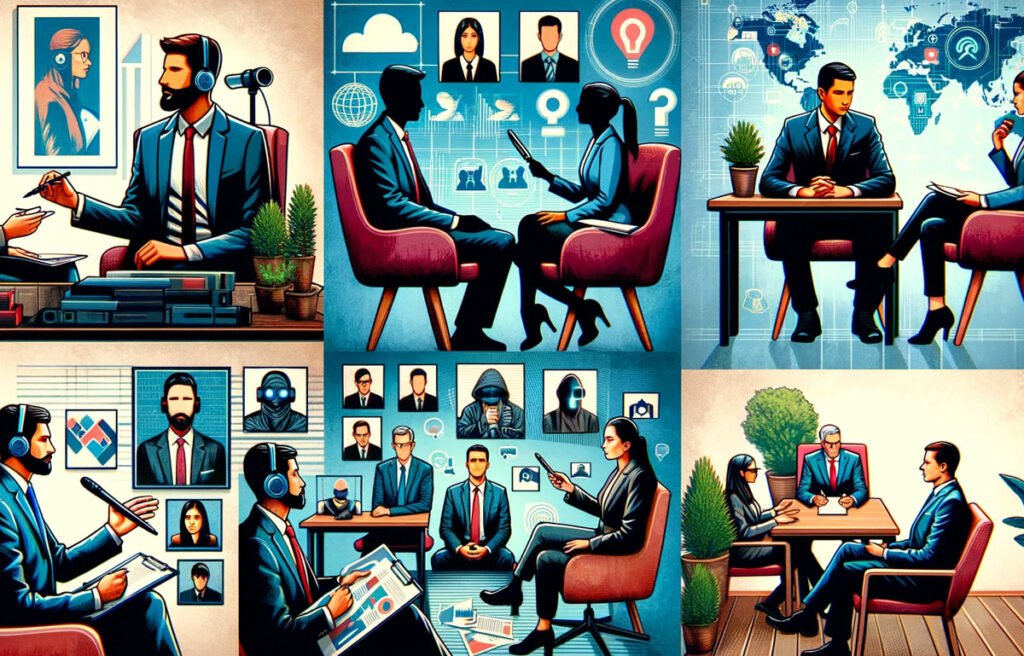
Navigating the landscape of job interviews can be like exploring a city with diverse neighborhoods – each type of interview has its own unique characteristics and challenges. Understanding these differences is crucial to tailor your preparation effectively.
1. One-on-One Interviews
These are the most common format, involving a conversation between you and a single interviewer, typically a hiring manager or a potential supervisor. These interviews focus on assessing your skills, experiences, and fit for the team and organization.
2. Panel Interviews
In a panel interview, you are interviewed by multiple people at once. This could include managers from different departments, HR representatives, and future colleagues. The key here is to engage with each panel member, addressing them individually and maintaining eye contact.
3. Group Interviews
In these settings, multiple candidates are interviewed simultaneously. They often include group activities or discussions to assess your teamwork and leadership skills. It’s important to balance being assertive with being cooperative and respectful of others.
4. Behavioral Interviews
These interviews focus on your past behavior in professional situations. You’ll be asked to share specific examples that demonstrate your skills and abilities. The STAR (Situation, Task, Action, Result) method is an effective way to structure your responses.
5. Technical Interviews
Particularly common in the tech industry, these interviews assess your technical skills and knowledge. They may include coding challenges, problem-solving tasks, or theoretical questions.
6. Case Interviews
Used frequently in consulting and finance, case interviews involve solving a business problem or case study. They test your analytical skills, problem-solving ability, and how you apply your knowledge in real-world scenarios.
7. Virtual Interviews
Conducted over video call platforms, virtual interviews have become increasingly popular. They require you to be comfortable with technology, mindful of your environment, and capable of maintaining engagement over a digital medium.
8. Informal Interviews
Sometimes interviews take place in a more informal setting, like a coffee shop. Though the setting is casual, maintain professionalism. These interviews often assess your cultural fit and interpersonal skills.
Understanding the nuances of each interview type allows you to adapt your preparation, presentation, and responses accordingly. Recognizing what each format demands can significantly enhance your performance and increase your chances of success.
Researching the Company and Role
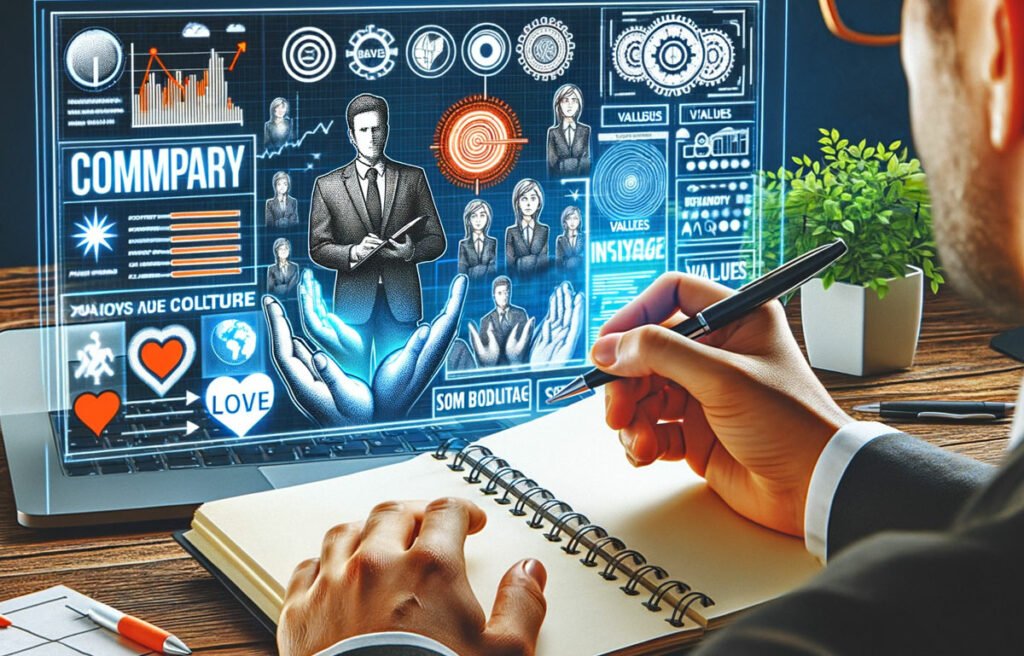
Understanding the company you’re interviewing with and the specifics of the role you’re applying for is a critical component of your interview preparation. It’s not just about impressing the interviewer with your knowledge but also about determining if the company and position are the right fit for you.
Why Research Matters
- Shows Initiative: Demonstrates your interest and dedication to the role.
- Informed Responses: Tailor your answers to align with the company’s values and needs.
- Better Questions: Ask insightful questions that reflect your understanding of the company.
Researching the Company
- Company Website: Start with their official website. Pay attention to the ‘About Us’ and ‘Careers’ sections.
- Social Media: Check their presence on platforms like LinkedIn, Twitter, and Facebook. Social media often provides insights into the company culture and recent achievements.
- Recent News: Look for recent news articles, press releases, and financial reports to understand the company’s current standing and future plans.
- Industry Standing: Understand where the company stands in its industry. Are they a leading player, a startup, or a traditional entity?
- Competitors: Knowing the company’s main competitors provides context to their strategies and challenges.
- Reviews and Forums: Sites like Glassdoor can offer insights from current and former employees.
Researching the Role
- Job Description: Carefully analyze the job description. Understand the required skills, responsibilities, and expectations.
- Role in the Organization: Try to understand how this role fits into the larger organization.
- Potential Challenges: Identify potential challenges you might face in the role and think about how you would address them.
- Growth Opportunities: Consider how this role can contribute to your long-term career goals.
Thorough research equips you with the knowledge to confidently discuss the company and role, showing your genuine interest and preparation. It also helps you decide if the opportunity aligns with your career aspirations.
Preparing Your Responses

Crafting and rehearsing your responses is an essential aspect of interview preparation. It’s not just about what you say, but how you say it. The goal is to communicate your skills, experiences, and suitability for the role in a clear, concise, and compelling manner.
Understanding the Questions
- Common Questions: Prepare for frequently asked questions like “Tell me about yourself,” “Why are you interested in this role?” and “What are your strengths and weaknesses?”
- Role-Specific Questions: Anticipate questions related to the specific role and your relevant experience.
- Behavioral Questions: Prepare for questions that seek to understand how you’ve handled situations in the past. Use the STAR method (Situation, Task, Action, Result) to structure your responses.
Crafting Your Responses
- Be Concise: Avoid rambling. Aim for clear, concise responses that directly address the question.
- Relevance: Tailor your answers to reflect the skills and experiences most relevant to the role.
- Examples: Use specific examples from your past experience to illustrate your points.
- Practice: Rehearse your responses, but avoid sounding memorized. Aim for natural and conversational delivery.
The STAR Method
- Situation: Briefly describe the context of your story.
- Task: Explain the task and your responsibility.
- Action: Detail the specific actions you took to address the task.
- Result: Share the outcomes of your actions, focusing on positive results and learnings.
Mock Interviews
Consider conducting mock interviews with a friend or mentor. This can help you get comfortable with your responses and receive constructive feedback.
Preparation is the key to ensuring that your responses during the interview are well-structured, relevant, and impactful. Remember, the way you articulate your experiences can make a significant difference in the impression you leave.
Personal Presentation

Personal presentation in an interview is about more than just dressing up. It’s a crucial part of your non-verbal communication, conveying professionalism, respect for the opportunity, and attention to detail. Your appearance can significantly influence the interviewer’s first impression of you.
Dress for Success
- Research the Company Culture: Understand the company’s dress code. Tech startups may have a more casual environment, while corporate roles often require formal attire.
- Err on the Side of Formality: If in doubt, it’s better to be slightly overdressed than underdressed.
- Fit and Comfort: Choose clothing that fits well and in which you feel comfortable and confident.
- Neat and Tidy: Ensure your clothes are clean, ironed, and in good condition.
Grooming
- Well-Groomed Appearance: Pay attention to personal grooming – tidy hair, clean nails, and minimal, if any, perfume or cologne.
- Subtle Makeup: If you wear makeup, keep it professional and understated.
Accessories
- Minimal Jewelry: Keep jewelry simple and professional.
- Professional Bag or Briefcase: Carry a neat, organized bag or briefcase if needed.
Final Touches
- Body Language: Maintain good posture, make eye contact, and offer a firm handshake.
- Facial Expressions: Be mindful of your facial expressions; smile genuinely to convey friendliness and enthusiasm.
The Night Before
- Prepare Your Outfit: Select and prepare your outfit the night before to avoid last-minute stress.
- Get Enough Sleep: Ensure you are well-rested for a fresh appearance.
Remember, the way you present yourself in an interview can leave a lasting impression. It’s about showcasing professionalism and respect for the interviewer and the opportunity.
Body Language and Communication Skills

In an interview, what you don’t say can be just as important as your verbal responses. Your body language and communication skills play a crucial role in conveying confidence, enthusiasm, and professionalism. Mastering these non-verbal cues can significantly enhance the impact of your interview performance.
Body Language Tips
- First Impressions: Start with a firm handshake and a confident smile.
- Posture: Sit up straight but comfortably. Avoid slouching or appearing too rigid.
- Eye Contact: Maintain consistent eye contact, but remember to blink and look away occasionally to avoid staring.
- Gestures: Use hand gestures naturally to emphasize points, but avoid overdoing it.
- Facial Expressions: Show attentiveness and interest through your facial expressions.
- Mirroring: Subtly mirroring the interviewer’s body language can create a sense of rapport.
Communication Skills
- Clarity and Conciseness: Speak clearly and be concise in your responses.
- Pace: Be mindful of your speaking pace. Avoid speaking too quickly or too slowly.
- Tone of Voice: Use a friendly yet professional tone. Vary your tone to keep the conversation engaging.
- Listening Skills: Show that you’re actively listening by nodding and acknowledging the interviewer’s comments.
Avoiding Negative Cues
- Fidgeting: Avoid fidgeting or playing with your hair or clothing.
- Crossed Arms: Keep your arms open and relaxed rather than crossed, which can appear defensive.
- Distractions: Be mindful of distractions and maintain focus on the interviewer.
Practicing Your Non-Verbal Communication
- Mock Interviews: Practice with a friend or in front of a mirror to become more aware of your body language and communication style.
- Feedback: Seek feedback on your non-verbal cues to identify areas for improvement.
Your body language and communication skills can significantly influence the interviewer’s perception of you. Being aware of and refining these skills can help you present yourself as the confident, capable candidate you are.
Practical Preparation Tips
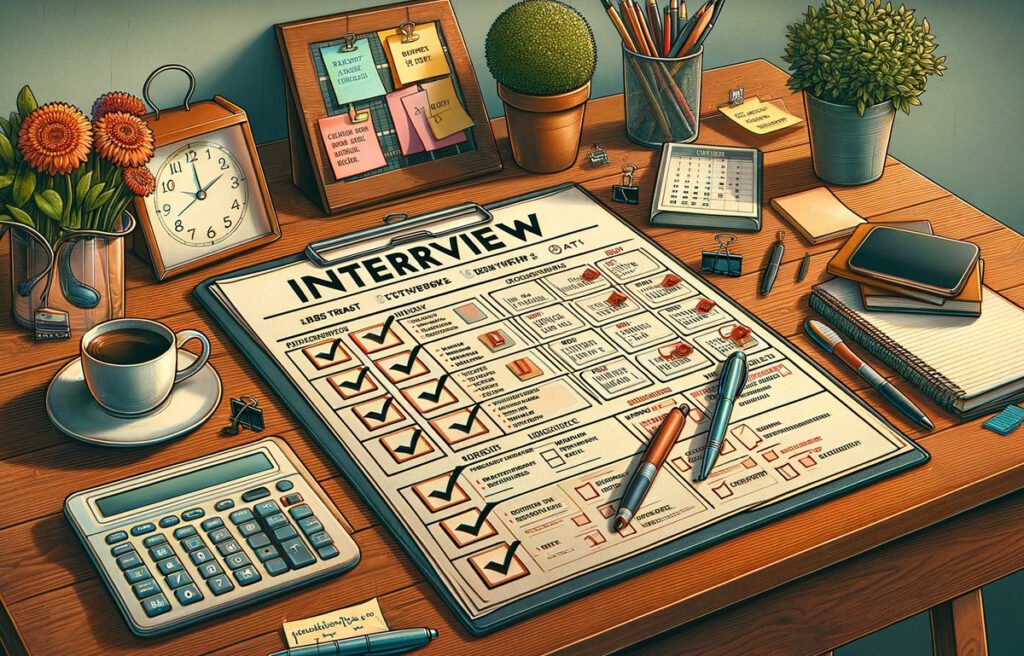
Preparing for an interview is about more than just rehearsing answers. It involves a series of practical steps to ensure that you arrive at your interview organized, punctual, and stress-free. Here’s a checklist to help you prepare for the big day:
Day-Before Checklist
- Review Your Material: Go over your resume, cover letter, and the job description. Familiarize yourself with the main points you want to discuss.
- Plan Your Route: Determine how you will get to the interview location. Consider traffic, public transportation schedules, and parking options.
- Prepare Your Outfit: Lay out your interview attire, ensuring everything is clean, pressed, and ready to wear.
- Pack Your Bag: Include copies of your resume, a list of references, a notebook and pen, and any other necessary documents.
Morning of the Interview
- Wake Up Early: Give yourself plenty of time to get ready without rushing.
- Eat a Healthy Breakfast: Choose something that will give you energy and keep you focused.
- Final Review: Glance over your notes one last time.
- Leave Early: Aim to arrive 10-15 minutes before your scheduled interview time.
At the Interview Location
- Turn Off Your Phone: Ensure your phone is either turned off or on silent mode.
- Take Deep Breaths: Stay calm and composed. Practice some deep breathing exercises if you feel anxious.
- Greet Receptionist Politely: Your interview starts the moment you enter the building.
Post-Interview
- Reflect on Your Performance: Jot down notes on what went well and areas for improvement.
- Send a Thank-You Note: Follow up with a brief thank-you email or note to the interviewer within 24 hours.
Proper preparation can significantly reduce stress and increase your chances of success. By following these practical tips, you can ensure that you are fully ready to make a great impression on your interview day.
Handling Interview Anxiety

Interviews can be nerve-wracking, even for the most experienced professionals. Feeling anxious is natural, but it’s important to manage this anxiety so it doesn’t hinder your performance. Here are strategies to help you stay calm and focused during your interview.
Recognize and Acknowledge Your Anxiety
- Understand it’s Normal: Recognize that it’s normal to feel nervous about an interview.
- Identify Triggers: Think about what aspects of the interview process make you most anxious and prepare specifically for those areas.
Techniques to Reduce Anxiety
- Deep Breathing Exercises: Practice deep breathing to calm your nerves. Inhale slowly for a count of five, hold for a count of three, and exhale for a count of seven.
- Visualization: Visualize a successful interview experience. Imagine yourself answering questions confidently and leaving a positive impression.
- Positive Affirmations: Use positive affirmations to boost your confidence. Remind yourself of your qualifications and past successes.
Preparation is Key
- Mock Interviews: Practice with friends or family members to get comfortable with the format and receive feedback.
- Know Your Resume: Be familiar with everything on your resume so you can confidently discuss your experiences.
- Plan Your Journey: Ensure you know exactly where you’re going and how long it takes to get there, so you’re not rushed or flustered.
During the Interview
- Pause Before Answering: It’s okay to take a moment to gather your thoughts before responding to a question.
- Mindfulness: Stay in the moment. Focus on the question at hand rather than worrying about what’s coming next.
- Body Language: Maintain good posture and smile. Positive body language can influence your mood and confidence.
After the Interview
- Reflect: Take some time to reflect on the interview. Focus on what went well and what you can improve for next time.
- Relax and Reward Yourself: After the interview, do something enjoyable or relaxing to reward yourself for your effort.
Managing interview anxiety is about preparation, self-awareness, and employing calming techniques. By utilizing these strategies, you can reduce your nervousness and present your best self in the interview.
Mock Interviews and Practice
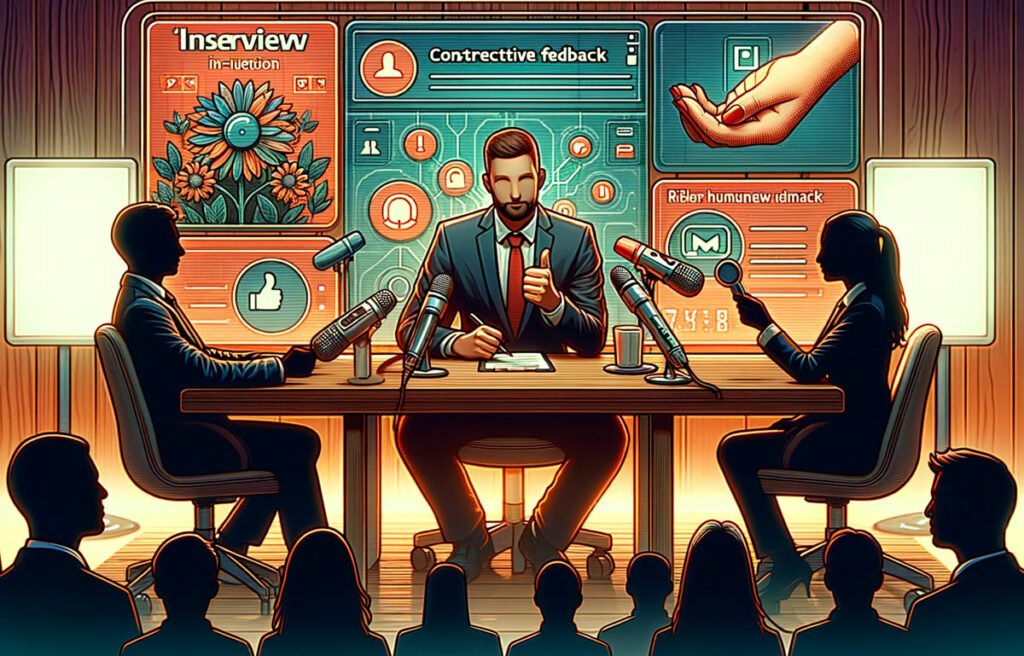
Practicing through mock interviews is one of the most effective ways to prepare for the real thing. They provide a safe space to hone your interviewing skills, receive feedback, and improve your confidence. Here’s how you can make the most of mock interviews and practice sessions.
Benefits of Mock Interviews
- Realistic Experience: Simulates the pressure and format of an actual interview.
- Feedback: Offers an opportunity to receive constructive feedback on your responses, body language, and overall presentation.
- Confidence Building: Helps build confidence as you become more familiar with the interview process.
Setting Up a Mock Interview
- Find a Practice Partner: Choose someone who can give you honest, constructive feedback. This could be a mentor, friend, or professional coach.
- Create a Realistic Environment: Try to mimic a real interview setting. Dress in your interview attire and set up a quiet, formal space.
- Prepare Questions: Use a mix of common and role-specific interview questions. Include challenging questions to push yourself.
During the Mock Interview
- Treat it Seriously: Approach it as if it’s a real interview. This will help you get used to the interview atmosphere.
- Practice Your Responses: Use this opportunity to refine your answers and practice using the STAR method for behavioral questions.
- Work on Non-Verbal Cues: Pay attention to your body language, eye contact, and other non-verbal cues.
Receiving Feedback
- Be Open to Critique: Listen to the feedback without getting defensive. Remember, the goal is to improve.
- Take Notes: Write down key points of feedback so you can refer back to them later.
- Ask for Specifics: If the feedback is vague, ask for specific examples or suggestions for improvement.
Repeat the Process
- Practice Regularly: Conduct several mock interviews to continue improving.
- Vary Your Practice Partners: If possible, practice with different people to get a range of perspectives and questions.
Mock interviews are a valuable tool in your interview preparation arsenal. They help you practice your responses, improve your communication skills, and build confidence, all of which are key to performing well in the actual interview.
Follow-Up After the Interview
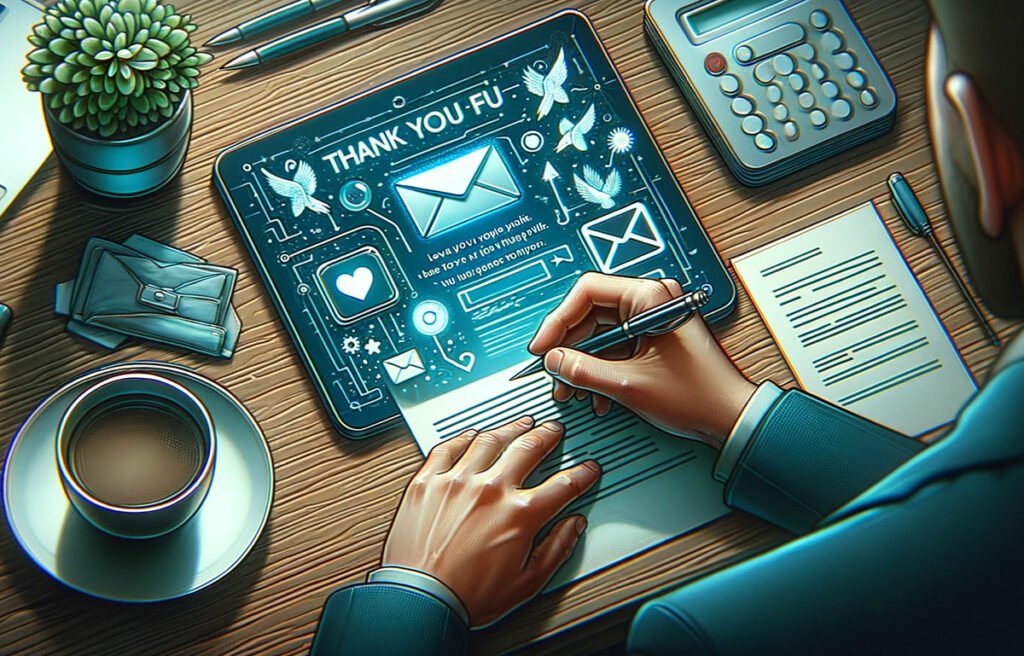
The interview process doesn’t end when you leave the room. The follow-up is an important step to reinforce your interest in the role and leave a lasting impression. Here’s how you can effectively follow up after your interview.
Sending a Thank-You Note
- Timing: Send a thank-you email within 24 hours of your interview.
- Personalize: Address the interviewer by name and reference specific topics or discussions from the interview.
- Express Gratitude: Thank them for their time and the opportunity to interview.
- Reiterate Interest: Clearly state your enthusiasm for the role and the company.
- Brevity is Key: Keep the message concise and to the point.
Sample Thank-You Email
Subject: Thank You for the Opportunity – [Your Name]
Dear [Interviewer’s Name],
I wanted to express my sincere gratitude for the opportunity to interview for the [Position Title] role at [Company Name] yesterday. It was a pleasure learning more about the team and the exciting projects on the horizon.
I am particularly excited about the prospect of being able to contribute to [specific aspect of the job or project discussed during the interview], as I believe my experience with [a relevant skill or experience] aligns well with the needs of your team.
Thank you once again for considering my application. I am very enthusiastic about the possibility of joining [Company Name] and contributing to its success. Please do not hesitate to contact me if you need any further information.
Warm regards,
[Your Name]
Post-Interview Reflection
- Reflect on Your Performance: Think about what went well and areas for improvement. This will help in future interviews.
- Record Key Points: Write down any important information or insights gained during the interview.
If You Haven’t Heard Back
- Follow-Up Email: If you haven’t received a response within the expected timeframe, it’s appropriate to send a polite follow-up email inquiring about the status of your application.
- Stay Professional: Keep your message courteous and professional. Express your continued interest in the role.
Managing Expectations
- Stay Patient: The hiring process can take time. Keep yourself occupied with other applications or activities.
- Be Prepared for Any Outcome: Remember that not getting the job is not a reflection of your worth. Each interview is a learning experience.
A thoughtful follow-up after an interview can distinguish you from other candidates. It’s an opportunity to reinforce your interest in the role and demonstrate your professionalism.
Frequently Asked Questions (FAQs)

Interview preparation can raise many questions. Here are some common FAQs that candidates often have, along with insightful answers to guide you through your interview preparation journey.
Q1: How Long Should My Answers Be in an Interview?
- A: Aim for 1-2 minutes per answer. Be concise but provide enough detail to fully answer the question. Avoid overly long or short responses that don’t adequately convey your message.
Q2: How Can I Best Prepare for Behavioral Interview Questions?
- A: Use the STAR method (Situation, Task, Action, Result) to structure your responses. Prepare examples from your past experiences that demonstrate your skills and abilities relevant to the role.
Q3: What Should I Do If I Don’t Know the Answer to a Question?
- A: It’s okay to admit if you don’t know the answer. You can say something like, “I’m not certain about that, but I would approach it by…” This shows your problem-solving skills and honesty.
Q4: Is It Appropriate to Bring Notes to an Interview?
- A: It’s generally better to bring only a copy of your resume and a list of references. Notes can make you seem unprepared or overly reliant on them. If you must bring notes, use them sparingly.
Q5: How Can I Show That I’m the Best Candidate for the Job?
- A: Highlight your relevant skills and experiences, show enthusiasm for the role and the company, and demonstrate how your background aligns with the job requirements and company culture.
Q6: What’s the Best Way to Handle Salary Questions?
- A: Research the average salary for the role beforehand. If asked, provide a salary range based on your research and be prepared to negotiate.
Q7: How Should I Address Employment Gaps in My Resume?
- A: Be honest and brief. Explain the reason for the gap (e.g., education, personal reasons) and focus on how you’ve stayed professionally active or developed skills during that time.
Q8: What Questions Should I Ask at the End of the Interview?
- A: Ask insightful questions that show your interest in the role and the company, such as inquiries about company culture, team dynamics, key challenges of the role, and future projects.
These FAQs cover some of the most common concerns candidates have. Remember, thorough preparation and understanding the interview process are key to navigating your interview successfully.
Key Takeaways for Interview Readiness

As we wrap up our comprehensive guide on interview preparation, let’s highlight the key takeaways to ensure you are thoroughly prepared and ready to make a great impression in your interviews.
Comprehensive Preparation
- Understand Different Interview Types: Familiarize yourself with various formats like one-on-one, panel, and virtual interviews.
- Research the Company and Role: Deeply understand the company, its culture, and the specifics of the role you’re applying for.
- Prepare Your Responses: Use methods like the STAR technique for behavioral questions and practice your responses to common interview questions.
Personal Presentation
- Dress Appropriately: Align your attire with the company culture and role. When in doubt, err on the side of formality.
- Mind Your Grooming: Ensure a neat and professional appearance.
Non-Verbal Communication
- Positive Body Language: Maintain good posture, eye contact, and use hand gestures appropriately.
- Effective Verbal Communication: Speak clearly, at a moderate pace, and be concise in your responses.
Day of the Interview
- Arrive Early: Plan to arrive 10-15 minutes before the interview.
- Bring Necessary Documents: Carry copies of your resume and any other required documents.
Post-Interview
- Send a Thank-You Note: Follow up with a brief, personalized thank-you note or email within 24 hours of the interview.
- Reflect and Learn: Think about what went well and areas where you can improve.
Handling Anxiety
- Stay Calm: Use techniques like deep breathing and positive visualization to manage interview anxiety.
Continuous Improvement
- Mock Interviews: Practice with mock interviews and seek feedback to improve.
- Learn From Each Experience: Each interview is a learning opportunity. Reflect on your experiences to continuously improve your interview skills.
Remember, success in interviews comes from a combination of thorough preparation, self-awareness, and the ability to communicate effectively. Keep these key points in mind, and you’ll be well on your way to acing your next interview.
